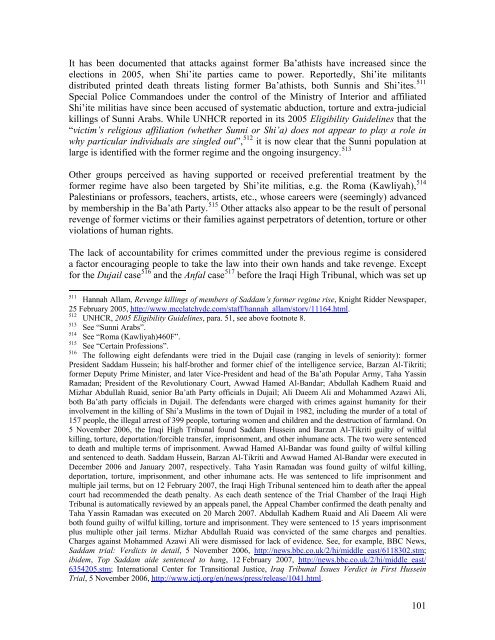UNHCR's ELIGIBILITY GUIDELINES FOR ASSESSING THE ...
UNHCR's ELIGIBILITY GUIDELINES FOR ASSESSING THE ...
UNHCR's ELIGIBILITY GUIDELINES FOR ASSESSING THE ...
Create successful ePaper yourself
Turn your PDF publications into a flip-book with our unique Google optimized e-Paper software.
It has been documented that attacks against former Ba’athists have increased since the<br />
elections in 2005, when Shi’ite parties came to power. Reportedly, Shi’ite militants<br />
distributed printed death threats listing former Ba’athists, both Sunnis and Shi’ites. 511<br />
Special Police Commandoes under the control of the Ministry of Interior and affiliated<br />
Shi’ite militias have since been accused of systematic abduction, torture and extra-judicial<br />
killings of Sunni Arabs. While UNHCR reported in its 2005 Eligibility Guidelines that the<br />
“victim’s religious affiliation (whether Sunni or Shi’a) does not appear to play a role in<br />
why particular individuals are singled out”, 512 it is now clear that the Sunni population at<br />
large is identified with the former regime and the ongoing insurgency. 513<br />
Other groups perceived as having supported or received preferential treatment by the<br />
former regime have also been targeted by Shi’ite militias, e.g. the Roma (Kawliyah), 514<br />
Palestinians or professors, teachers, artists, etc., whose careers were (seemingly) advanced<br />
by membership in the Ba’ath Party. 515 Other attacks also appear to be the result of personal<br />
revenge of former victims or their families against perpetrators of detention, torture or other<br />
violations of human rights.<br />
The lack of accountability for crimes committed under the previous regime is considered<br />
a factor encouraging people to take the law into their own hands and take revenge. Except<br />
for the Dujail case 516 and the Anfal case 517 before the Iraqi High Tribunal, which was set up<br />
511<br />
Hannah Allam, Revenge killings of members of Saddam’s former regime rise, Knight Ridder Newspaper,<br />
25 February 2005, http://www.mcclatchydc.com/staff/hannah_allam/story/11164.html.<br />
512<br />
UNHCR, 2005 Eligibility Guidelines, para. 51, see above footnote 8.<br />
513<br />
See “Sunni Arabs”.<br />
514<br />
See “Roma (Kawliyah)460F”.<br />
515<br />
See “Certain Professions”.<br />
516<br />
The following eight defendants were tried in the Dujail case (ranging in levels of seniority): former<br />
President Saddam Hussein; his half-brother and former chief of the intelligence service, Barzan Al-Tikriti;<br />
former Deputy Prime Minister, and later Vice-President and head of the Ba’ath Popular Army, Taha Yassin<br />
Ramadan; President of the Revolutionary Court, Awwad Hamed Al-Bandar; Abdullah Kadhem Ruaid and<br />
Mizhar Abdullah Ruaid, senior Ba’ath Party officials in Dujail; Ali Daeem Ali and Mohammed Azawi Ali,<br />
both Ba’ath party officials in Dujail. The defendants were charged with crimes against humanity for their<br />
involvement in the killing of Shi’a Muslims in the town of Dujail in 1982, including the murder of a total of<br />
157 people, the illegal arrest of 399 people, torturing women and children and the destruction of farmland. On<br />
5 November 2006, the Iraqi High Tribunal found Saddam Hussein and Barzan Al-Tikriti guilty of wilful<br />
killing, torture, deportation/forcible transfer, imprisonment, and other inhumane acts. The two were sentenced<br />
to death and multiple terms of imprisonment. Awwad Hamed Al-Bandar was found guilty of wilful killing<br />
and sentenced to death. Saddam Hussein, Barzan Al-Tikriti and Awwad Hamed Al-Bandar were executed in<br />
December 2006 and January 2007, respectively. Taha Yasin Ramadan was found guilty of wilful killing,<br />
deportation, torture, imprisonment, and other inhumane acts. He was sentenced to life imprisonment and<br />
multiple jail terms, but on 12 February 2007, the Iraqi High Tribunal sentenced him to death after the appeal<br />
court had recommended the death penalty. As each death sentence of the Trial Chamber of the Iraqi High<br />
Tribunal is automatically reviewed by an appeals panel, the Appeal Chamber confirmed the death penalty and<br />
Taha Yassin Ramadan was executed on 20 March 2007. Abdullah Kadhem Ruaid and Ali Daeem Ali were<br />
both found guilty of wilful killing, torture and imprisonment. They were sentenced to 15 years imprisonment<br />
plus multiple other jail terms. Mizhar Abdullah Ruaid was convicted of the same charges and penalties.<br />
Charges against Mohammed Azawi Ali were dismissed for lack of evidence. See, for example, BBC News,<br />
Saddam trial: Verdicts in detail, 5 November 2006, http://news.bbc.co.uk/2/hi/middle_east/6118302.stm;<br />
ibidem, Top Saddam aide sentenced to hang, 12 February 2007, http://news.bbc.co.uk/2/hi/middle_east/<br />
6354205.stm; International Center for Transitional Justice, Iraq Tribunal Issues Verdict in First Hussein<br />
Trial, 5 November 2006, http://www.ictj.org/en/news/press/release/1041.html.<br />
101
















